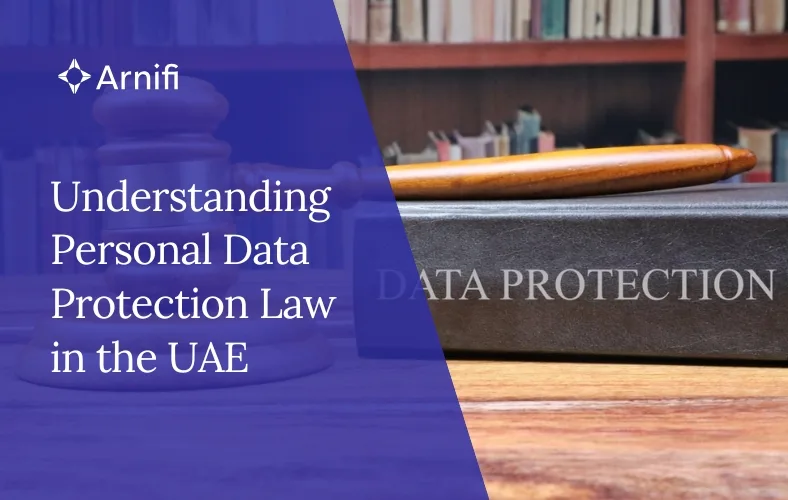Understanding Personal Data Protection Law in the UAE | A Guide to Compliance
by Shethana Aug 04, 2025  7 MIN READ
7 MIN READ

Get a clear look at the UAE’s new Personal Data Protection Law (PDPL) and how it stacks up against global frameworks like the GDPR. This guide breaks down the core elements of the law, what it means for businesses operating in the UAE, and practical steps for staying compliant.
If you run a company, handle customer data, or simply want to understand how your personal information is protected, this article gives you the essentials you need to know.
Table of contents
What is the UAE’s New Data Protection Law?
The UAE’s Personal Data Protection Law (PDPL), issued under Federal Decree-Law No. 45 of 2021, is the country’s first federal-level framework dedicated to safeguarding personal data and privacy. It marks a major shift in how data is regulated in the UAE, bringing local standards closer to global benchmarks like the EU’s General Data Protection Regulation (GDPR).
Key Objectives of the PDPL
The PDPL is designed to protect the personal data of individuals in the UAE, uphold their privacy rights, and set clear rules for how data is collected, stored, and shared. Its goal is to create a secure framework for managing data by outlining specific responsibilities for businesses and organizations that handle personal information.
The law applies not only to data controllers and processors based in the UAE but also to those operating outside the country if they manage data related to UAE residents. This wide reach ensures that anyone handling the personal data of individuals in the UAE must follow its requirements, no matter where the processing happens.
Scope of the PDPL
The PDPL sets out clear rules for how personal data must be collected, processed, stored, and shared. It requires organizations to get explicit consent before using someone’s data, keep that data accurate and updated, and safeguard it from unauthorized access or breaches.
It also gives individuals specific rights, such as accessing their data, requesting corrections, and asking for its deletion in certain cases. In addition, the law requires businesses to appoint a Data Protection Officer (DPO) when needed, carry out Data Protection Impact Assessments (DPIAs) for high-risk activities, and report data breaches to the UAE Data Office.
Who is Affected by the UAE Data Protection Law?
The UAE’s Personal Data Protection Law (PDPL) applies broadly, covering a wide range of businesses, individuals, and service providers both inside and outside the country. Its purpose is to ensure personal data is handled responsibly and securely, in line with global standards but tailored to the UAE’s context. Here’s who it impacts:
Businesses in the UAE
Any company operating in the UAE that processes personal data must comply with the PDPL. This includes organizations in sectors like retail, healthcare, finance, and telecom. International businesses with UAE branches or subsidiaries also fall under the law, even if the data is processed abroad, if it involves UAE residents.
Organizations Outside the UAE
The law has extraterritorial scope. Companies based outside the UAE must still comply if they process the personal data of individuals in the UAE. This is especially important for businesses handling cross-border data transfers, as the PDPL requires that data only be sent to countries offering adequate protection.
Data Controllers and Processors
Entities that decide why and how personal data is processed are classified as data controllers and carry primary responsibility for compliance, including consent, accuracy, and security measures. Data processors, organizations that process data on behalf of controllers, are also bound by the law and must follow strict requirements around confidentiality, security, and breach reporting.
Individuals (Data Subjects)
The PDPL protects personal data for anyone residing in the UAE, including citizens, expatriates, and visitors. Individuals have the right to access their data, request corrections, and ask for deletion in certain situations. The law can also extend protection to individuals outside the UAE when their data is processed by UAE-based entities.
Service Providers and Vendors
Third-party service providers, such as cloud storage companies, IT contractors, or marketing agencies, that process personal data must also comply with the PDPL. Subcontractors and partners handling data on behalf of UAE entities are included, making data protection obligations critical across entire supply chains.
How Can Businesses Stay Compliant with the UAE’s PDPL?
Compliance with the UAE’s Personal Data Protection Law (PDPL) requires a structured approach to managing and safeguarding personal data. Here’s what businesses should focus on:
Audit Your Data
Start by mapping all personal data your business collects, processes, and stores. Identify the types of data, where it comes from, how it’s used, and where it’s stored. Understanding these data flows is key to applying the right protections.
Create Clear Data Policies
Develop policies that explain how data is collected, processed, stored, and shared. Define the legal basis for processing and outline how consent is obtained and managed. Make sure these policies are communicated to staff and stakeholders.
Strengthen Security Measures
Use technical and organizational controls like encryption, access restrictions, anonymization, and regular security assessments. Keep protocols updated to address new risks and vulnerabilities.
Appoint a Data Protection Officer (DPO)
For high-risk or large-scale processing, appoint a DPO to oversee compliance, advise on data protection issues, and act as the point of contact with the UAE Data Office.
Enable Data Subject Rights
Set up processes for individuals to access, correct, or request deletion of their personal data. Train employees to handle these requests promptly and in line with PDPL timelines.
Prepare for Data Breaches
Have a breach response plan covering detection, reporting, and mitigation. Be ready to notify the UAE Data Office and affected individuals when required, and test your plan regularly.
Manage Cross-Border Transfers
When sending data outside the UAE, ensure the destination provides adequate protection or use contractual safeguards. In some cases, you may also need explicit consent from individuals.
What Are the Penalties for Non-Compliance with the UAE’s PDPL?
Failing to comply with the UAE’s Personal Data Protection Law can result in heavy fines, ranging from AED 50,000 up to AED 5 million, depending on the severity of the breach.
The exact amount is determined by the UAE Data Office and takes into account factors such as the type of violation, whether sensitive or large volumes of data were involved, and whether the breach was intentional or due to negligence.
Beyond financial penalties, businesses may also face operational restrictions, be required to implement corrective measures, and suffer reputational damage that can affect customer trust and future partnerships.
How Can Arnifi Help You Comply with UAE PDPL?
Arnifi simplifies PDPL compliance by guiding businesses through every step of the process. We help you identify gaps, implement the right data protection measures, and stay aligned with the law’s strict requirements.
Our team supports you with policy creation, risk assessments, and ongoing compliance management, ensuring your business can handle personal data securely and maintain stakeholder trust.
Ready to get compliant? Reach out to Arnifi today to safeguard your data and avoid costly penalties.
Top UAE Packages

Related Articles
Top UAE Packages



